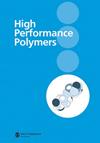具有改进加工性能的硅氧烷键邻苯二甲腈树脂的制备
IF 1.6
4区 化学
Q3 POLYMER SCIENCE
引用次数: 1
摘要
为了提高联苯基邻苯二甲腈树脂的加工性能,通过分子设计将柔性硅氧烷结构引入邻苯二甲酸单体中,然后与联苯基单体共混制备邻苯二腈合金树脂。当含有柔性硅氧烷的邻苯二甲腈单体与联苯邻苯二乙腈单体的比例为1:1时,与联苯邻二甲腈相比,加工窗口从58°C加宽到110°C。由于在邻苯二甲腈合金树脂中引入了联苯结构,含硅邻苯二乙腈树脂的初始分解温度从385℃提高到516℃。更重要的是,邻苯二甲腈合金树脂表现出高的弯曲强度(66MPa)和弯曲模量(3762MPa),表明它有潜力用作高温结构复合基体。此外,它为加工具有高熔点和窄加工窗口的邻苯二甲腈树脂提供了一种新的策略。本文章由计算机程序翻译,如有差异,请以英文原文为准。
Preparation of phthalonitrile resins containing siloxane linkages with improved processability
To improve the processability of biphenyl phthalonitrile resin, a flexible siloxane structure was introduced into the phthalonitrile monomer through molecular design, which was then blended with a biphenyl monomer to prepare phthalonitrile alloy resins. When the ratio of phthalonitrile monomer containing flexible siloxane to biphenyl phthalonitrile monomer was 1:1, the processing window widened from 58 to 110°C, as compared to that of biphenyl phthalonitrile. Due to the introduction of the biphenyl structure into the phthalonitrile alloy resins, the initial decomposition temperature of the silicon-containing phthalonitrile resin increased from 385 to 516°C. More importantly, the phthalonitrile alloy resin exhibited a high bending strength (66 MPa) and bending modulus (3762 MPa), indicating that it could be potentially applied as high temperature structural composite matrices. Furthermore, it provides a new strategy for processing phthalonitrile resins with a high melting point and narrow processing window.
求助全文
通过发布文献求助,成功后即可免费获取论文全文。
去求助
来源期刊

High Performance Polymers
化学-高分子科学
CiteScore
4.20
自引率
14.30%
发文量
106
审稿时长
1.2 months
期刊介绍:
Health Services Management Research (HSMR) is an authoritative international peer-reviewed journal which publishes theoretically and empirically rigorous research on questions of enduring interest to health-care organizations and systems throughout the world. Examining the real issues confronting health services management, it provides an independent view and cutting edge evidence-based research to guide policy-making and management decision-making. HSMR aims to be a forum serving an international community of academics and researchers on the one hand and healthcare managers, executives, policymakers and clinicians and all health professionals on the other. HSMR wants to make a substantial contribution to both research and managerial practice, with particular emphasis placed on publishing studies which offer actionable findings and on promoting knowledge mobilisation toward theoretical advances. All papers are expected to be of interest and relevance to an international audience. HSMR aims at enhance communication between academics and practitioners concerned with developing, implementing, and analysing health management issues, reforms and innovations primarily in European health systems and in all countries with developed health systems. Papers can report research undertaken in a single country, but they need to locate and explain their findings in an international context, and in international literature.
 求助内容:
求助内容: 应助结果提醒方式:
应助结果提醒方式:


